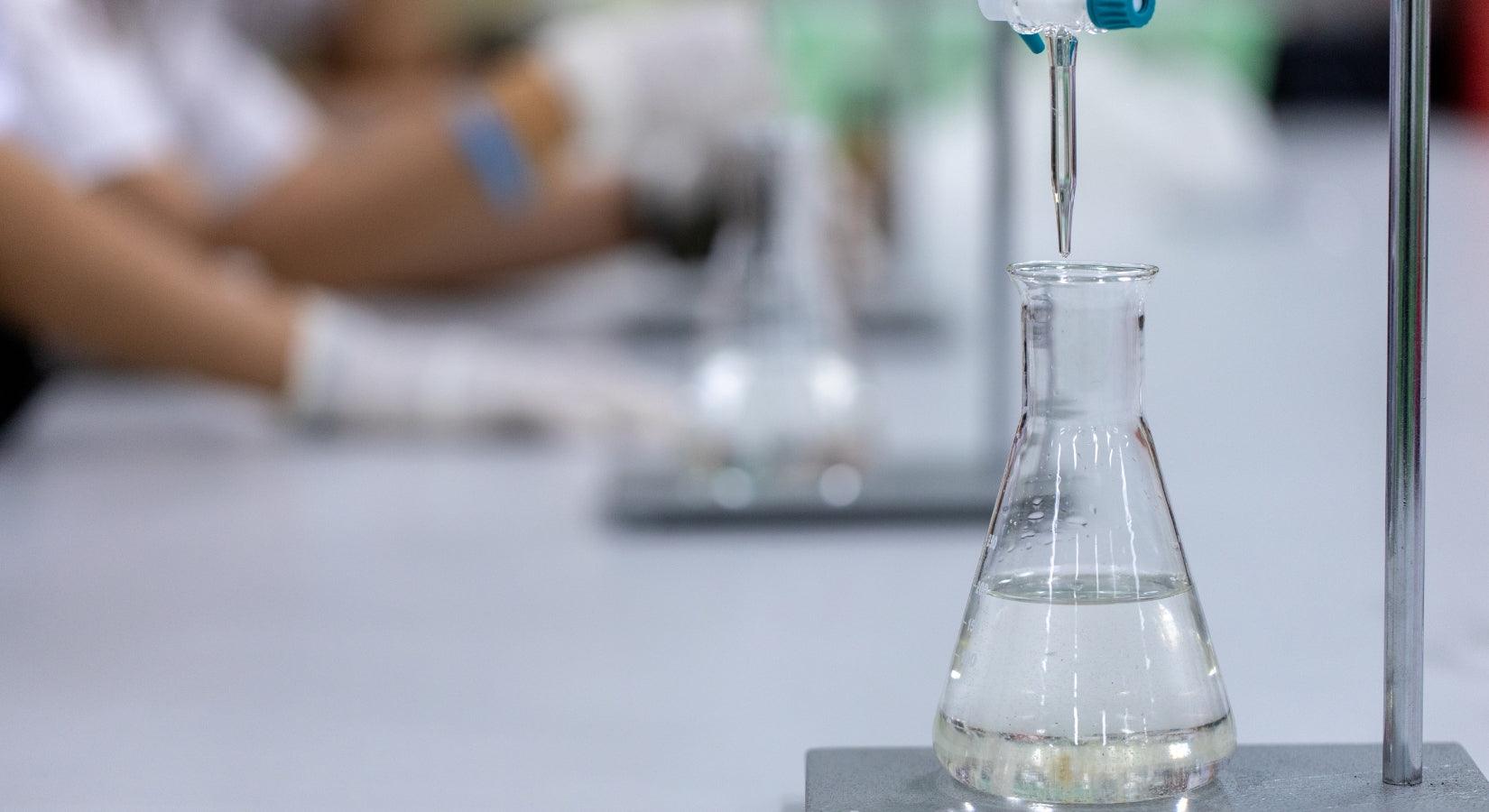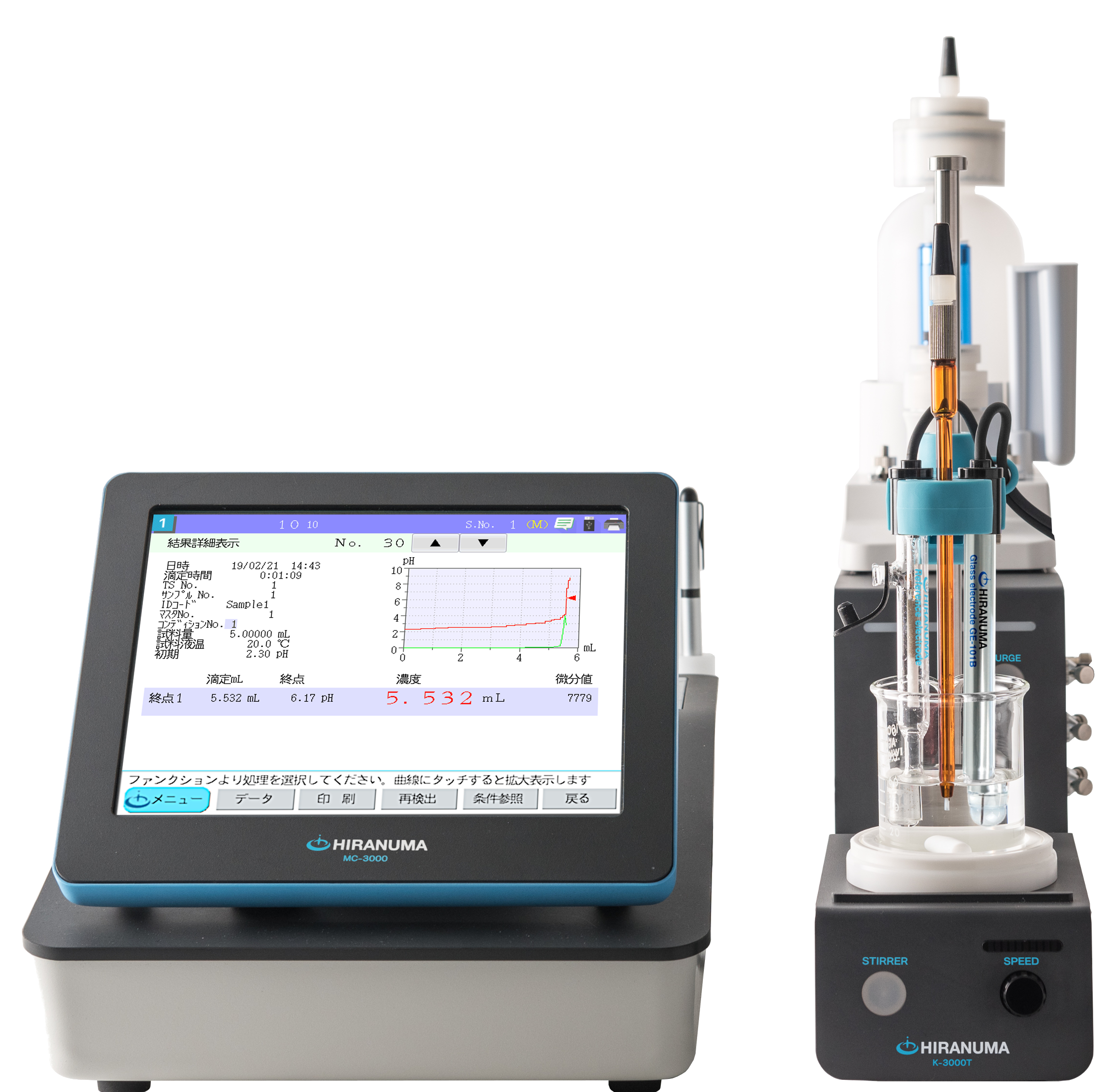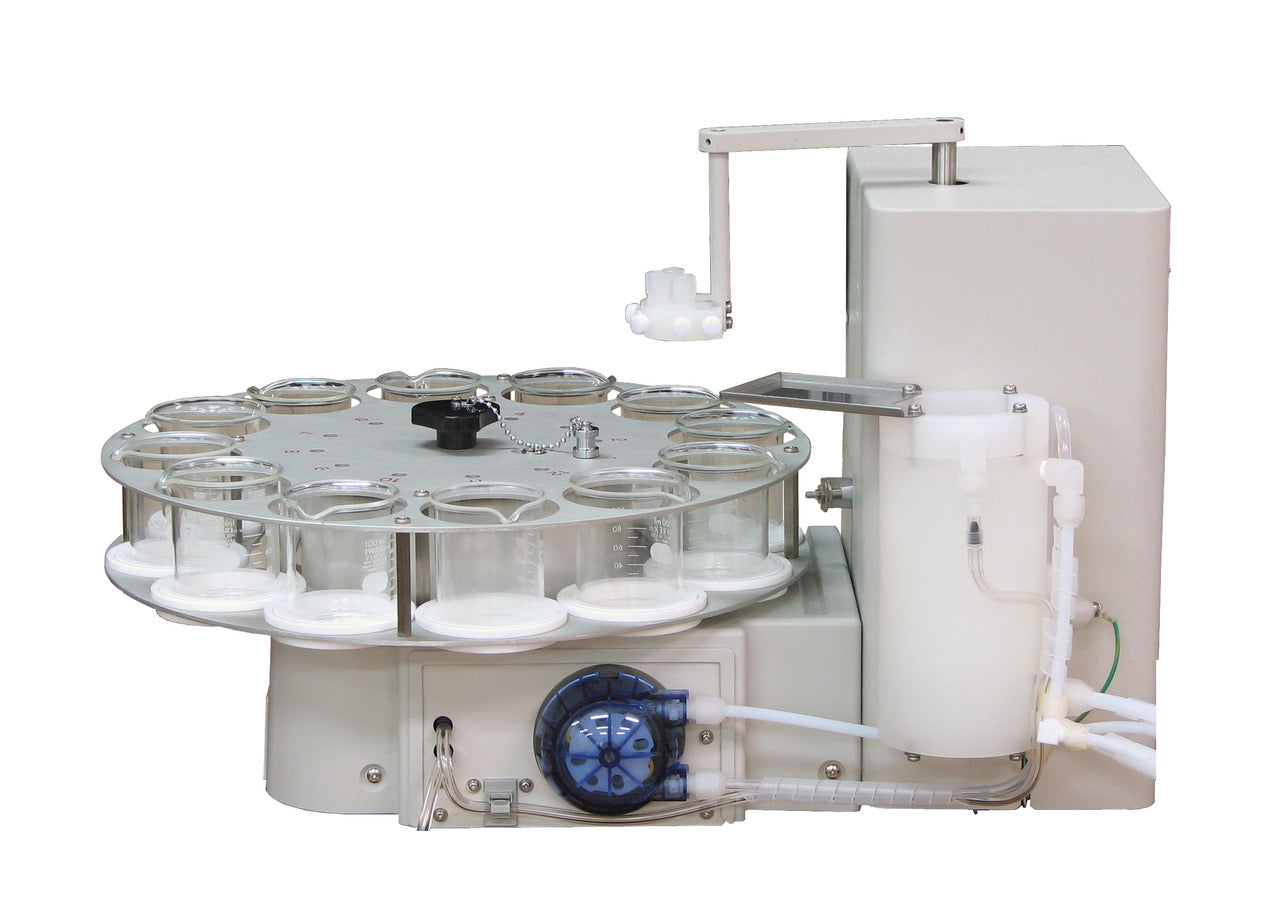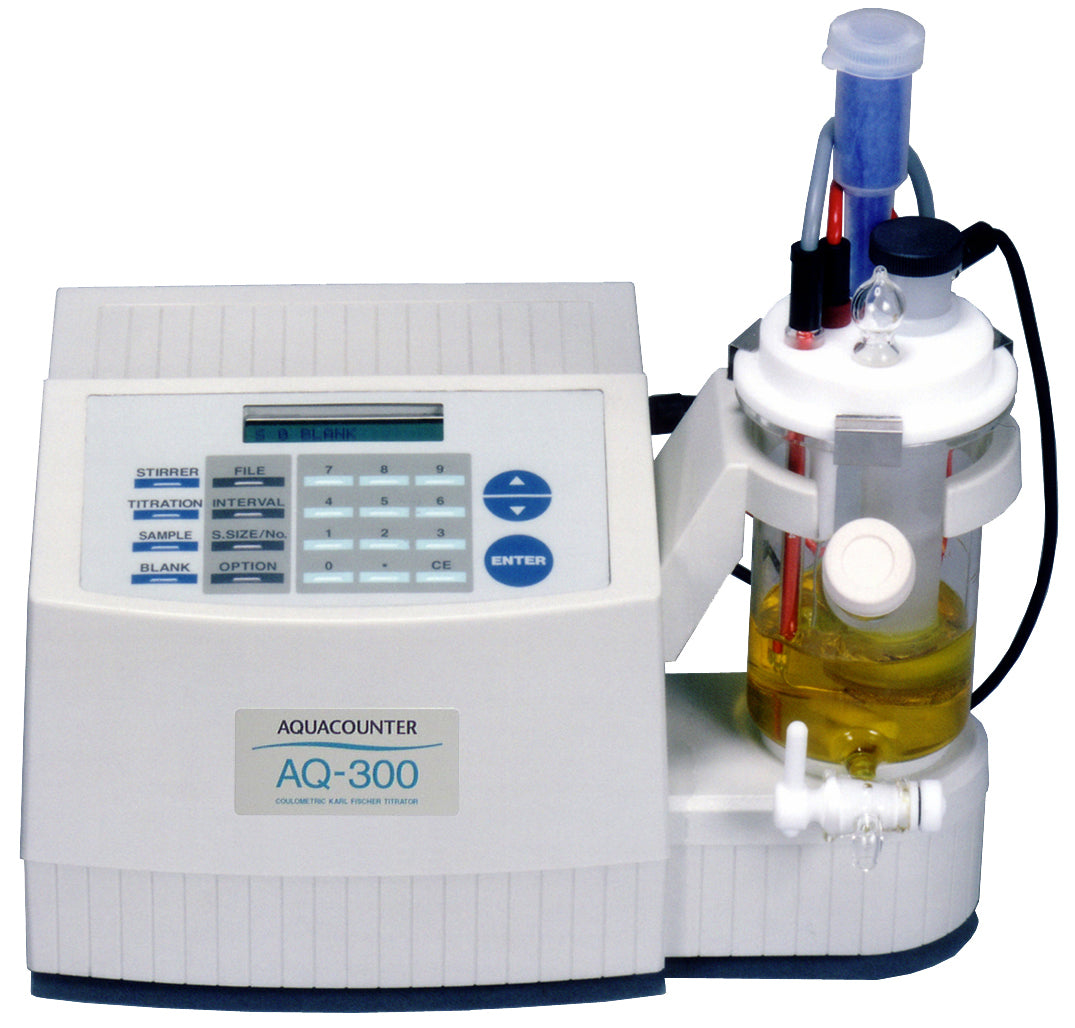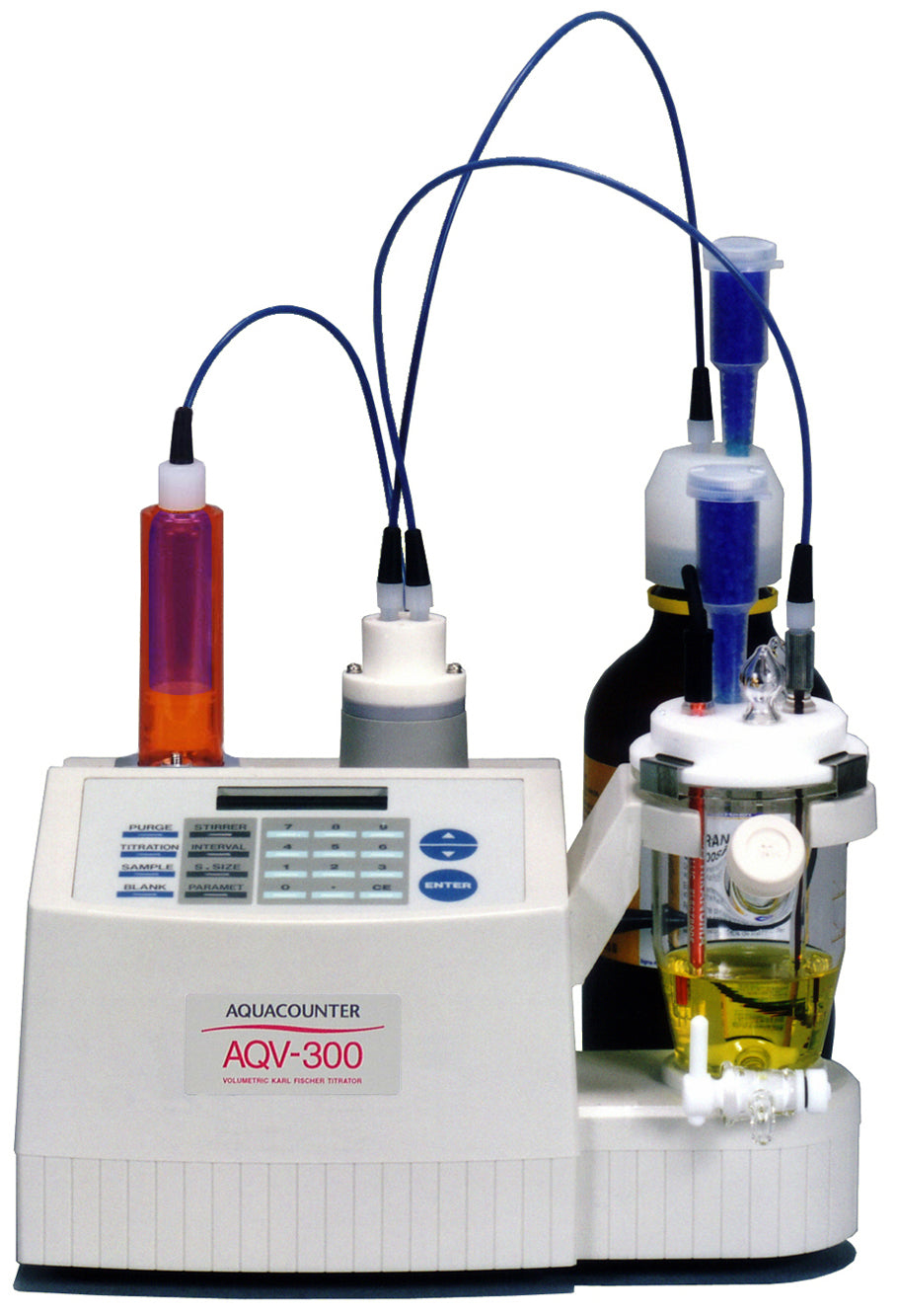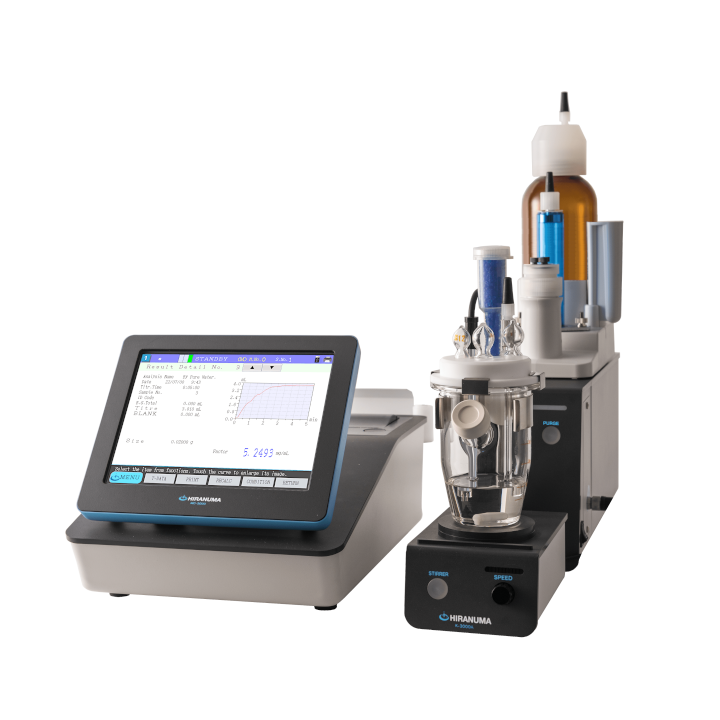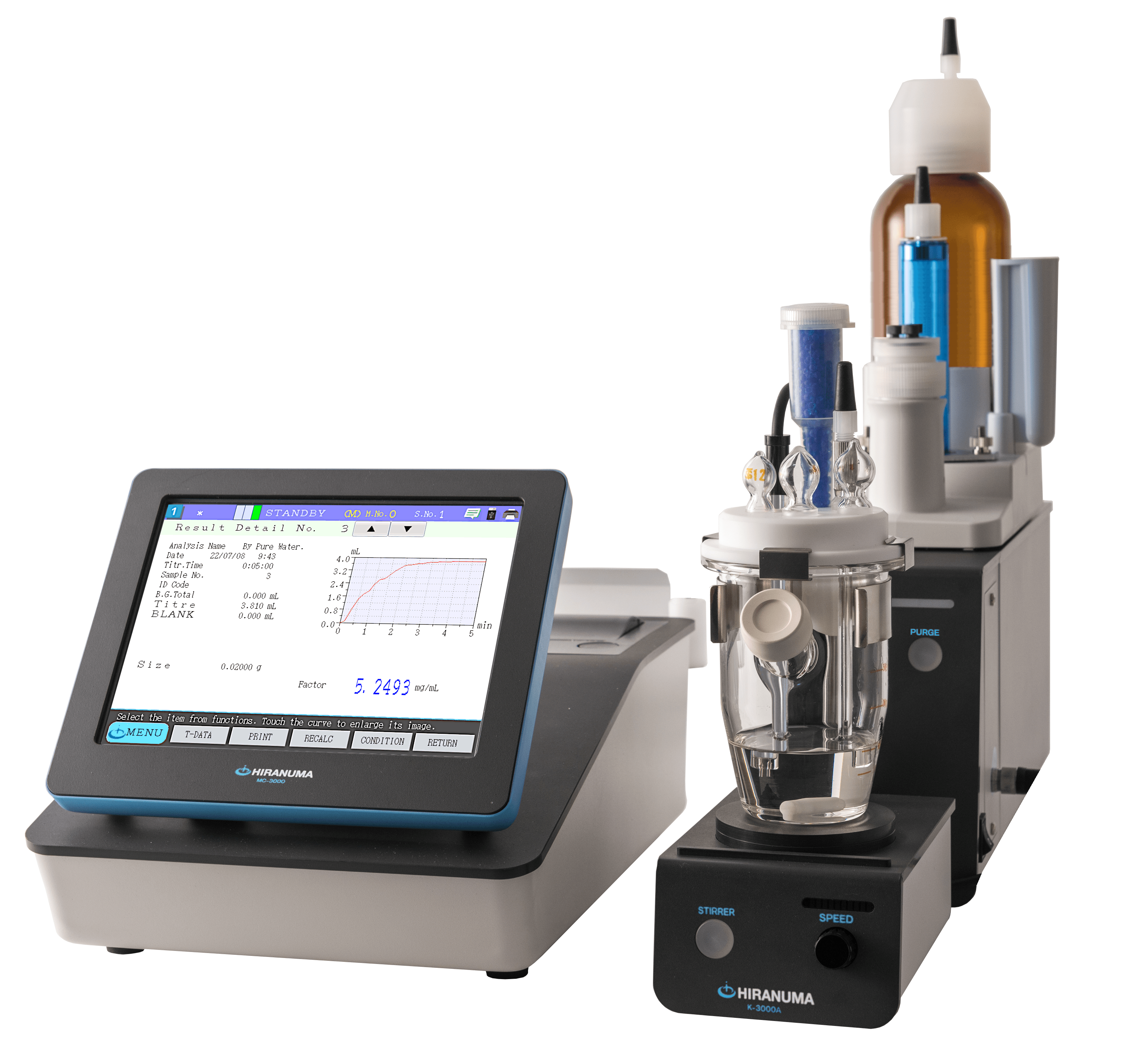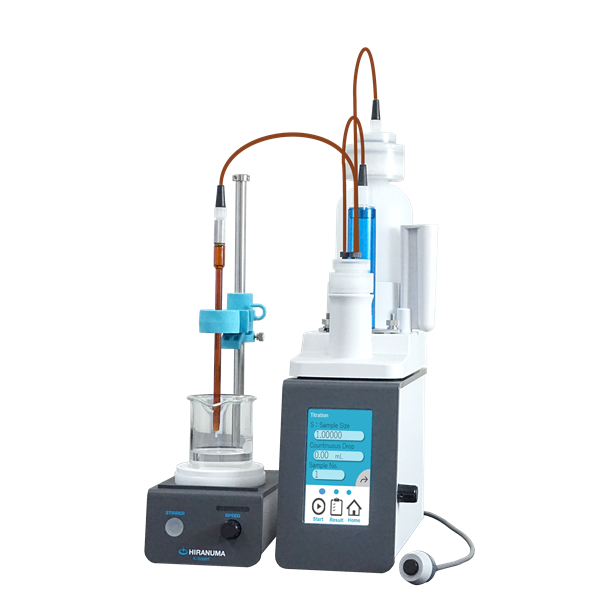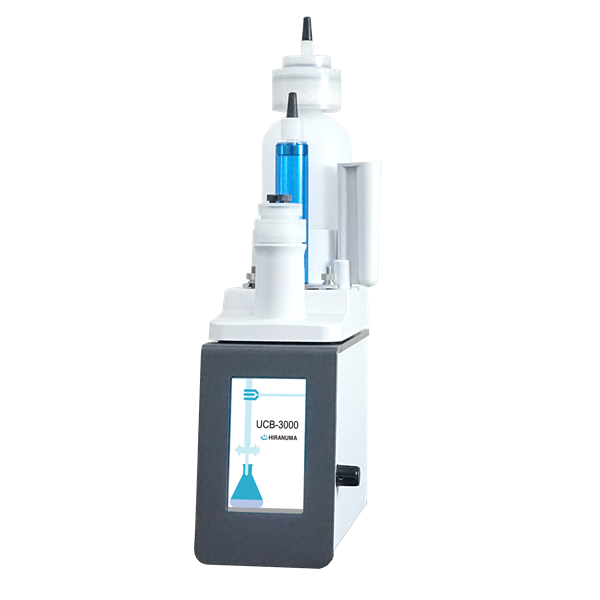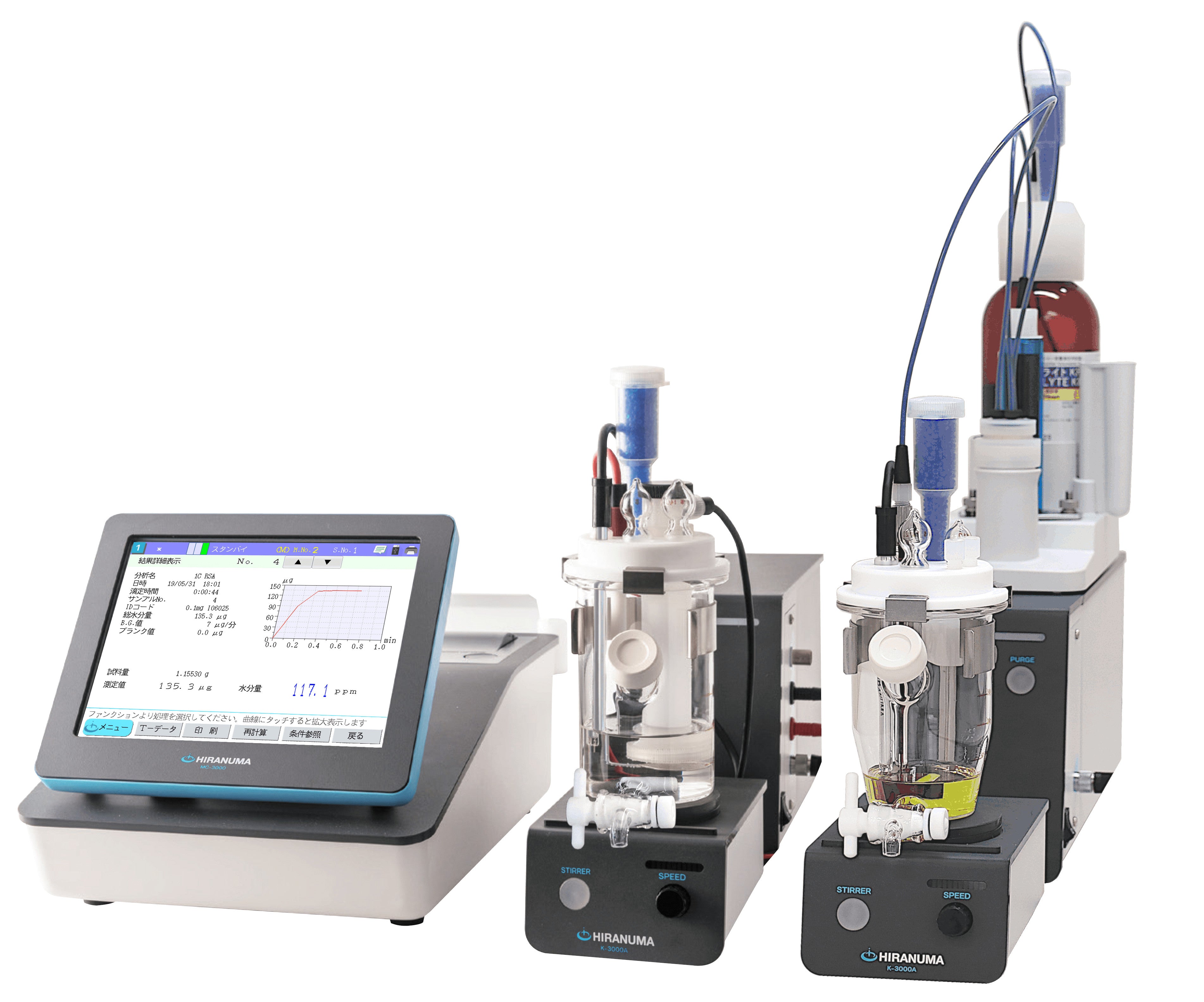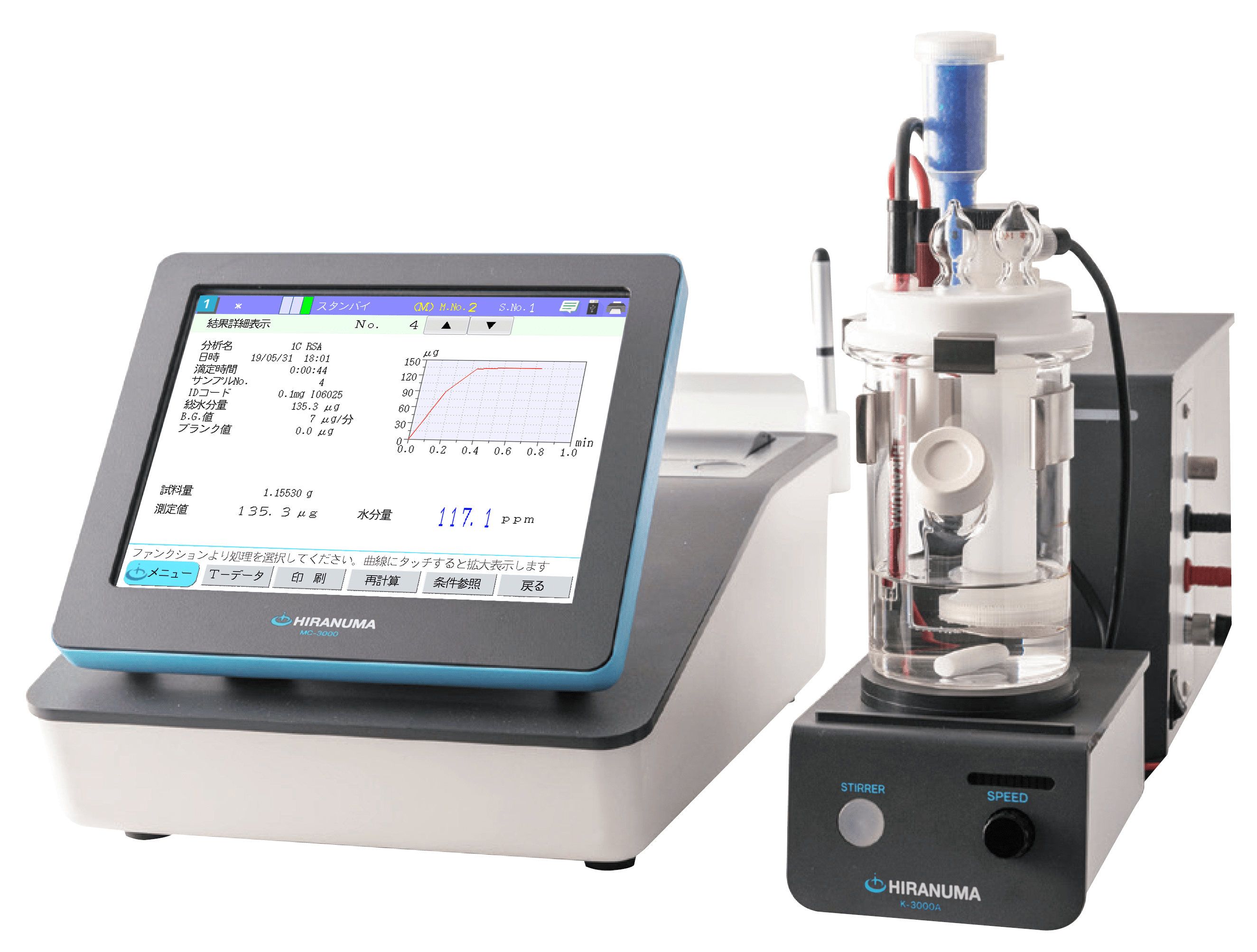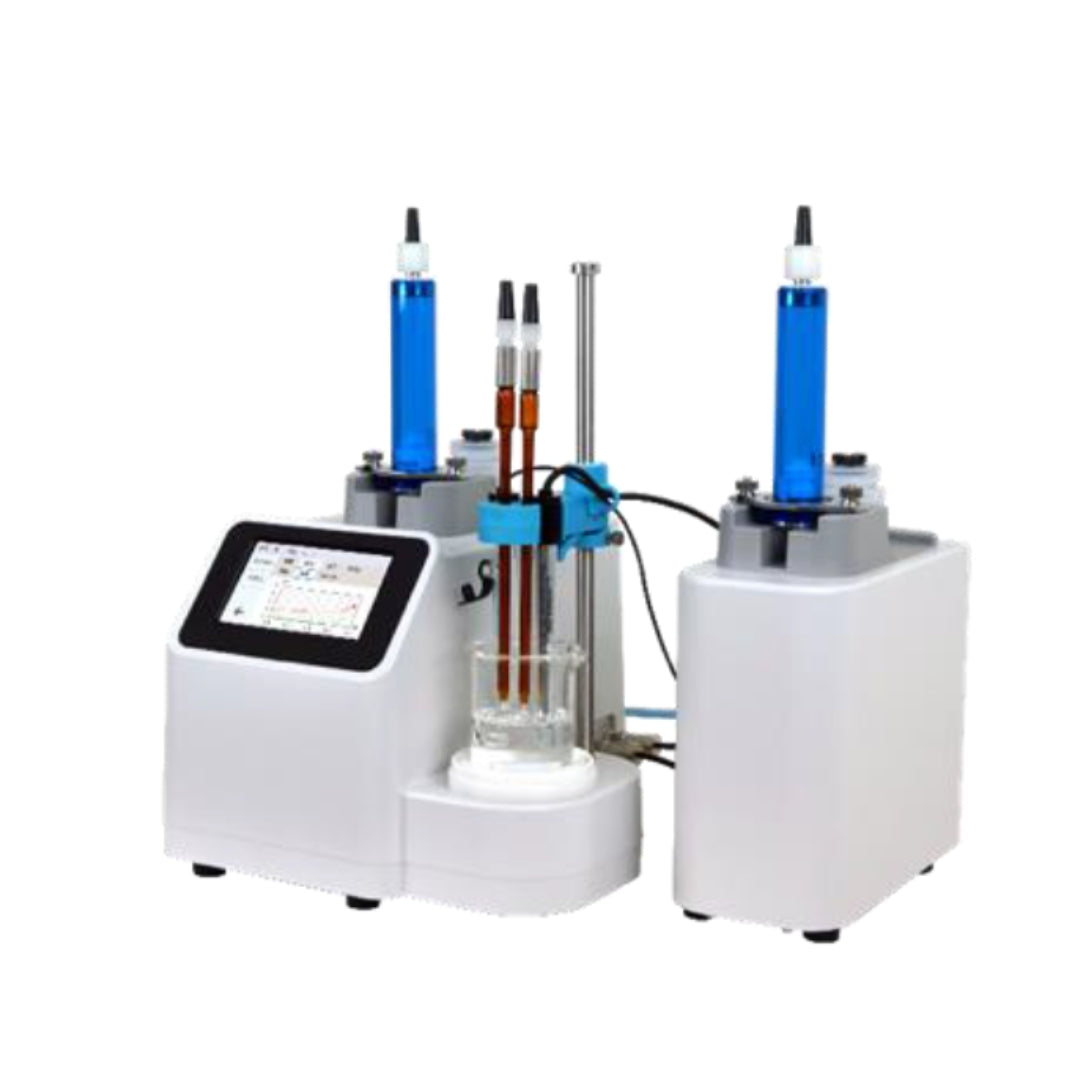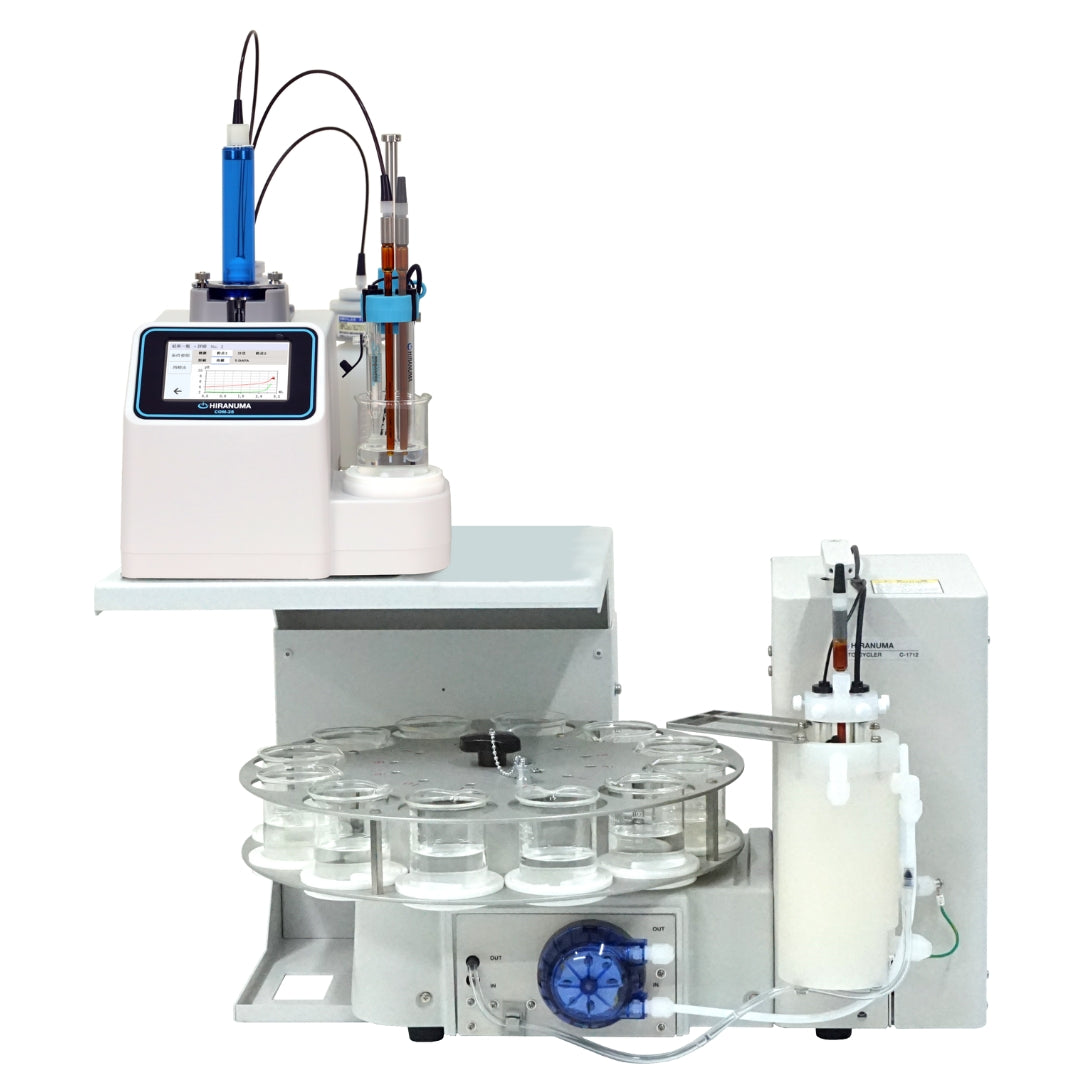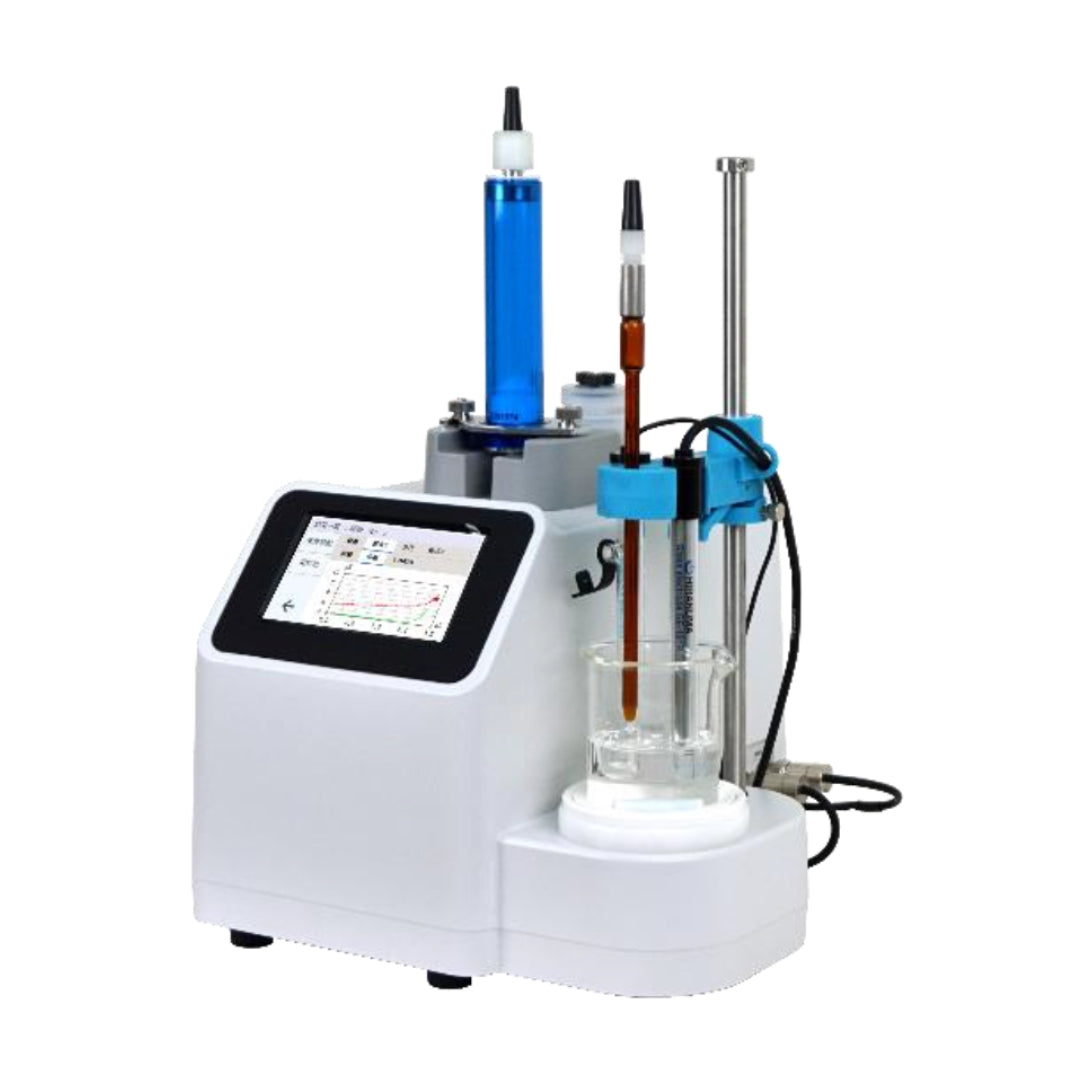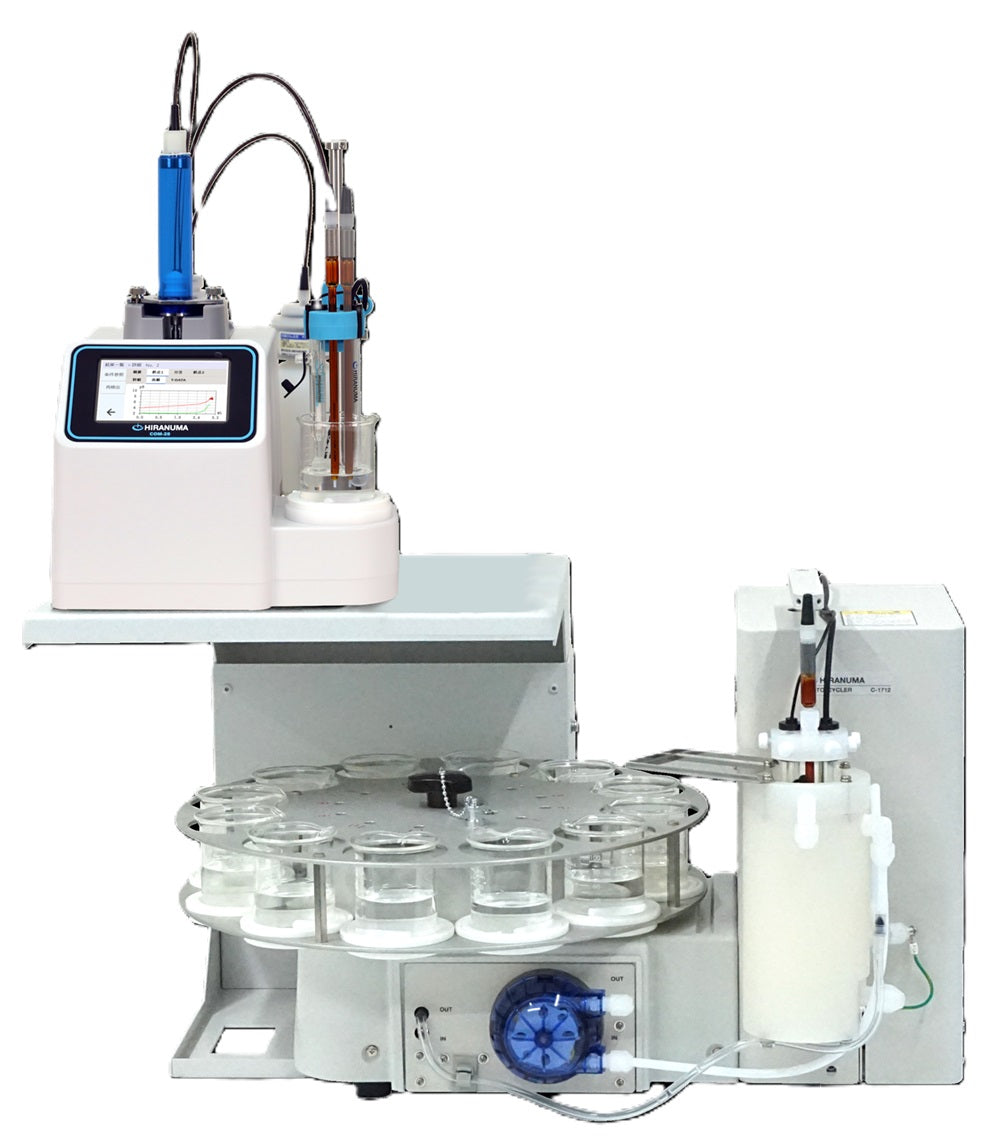| HIRANUMA APPLICATION DATA | Karl Fischer Titrator | Data No. | KF1 | Mar. 8 2018 |
| Water contents | Hydrocarbon, Halogenated hydrocarbon |
1. Abstract
Water content of hydrocarbon and halogenated hydrocarbon could be determined by Karl Fischer coulometric titrator. In coulometric titration, iodine of Karl Fischer reagent is generated by electrolysis and generated iodine quantitatively reacts with water. Reaction formula is described below.
H₂O + I₂ + SO₂ + 3RN + CH₃OH → 2RN・HI + RN・HSO₄CH₃
2RN・HI → I₂ + 2RN + 2H⁺ + 2e⁻
Hydrocarbon and halogenated hydrocarbon do not interfere the Karl Fischer reaction and direct injection method could apply. Anode solution is selected in accordance with sample solubility. General use of anode solution contain methanol as solvent. When the sample like a long chain hydrocarbon have poor solubility in methanol, anode solution containing chloroform or hexanol or toluene is used. When fritless cell is used, cathode solution is not necessary.
2. Apparatus and Reagents
| (1) | Apparatus | ||
| Titrator | : | HIRANUMA Karl Fischer Coulometric titrator AQ-series or MOICO-A19 | |
| Electrolytic cell | : | Standard Cell Fritless Cell |
|
| (2) | Reagents | ||
| Anode solution | : | Hydranal coulomat AG (Honeywell) | |
| Cathode solution | : | Hydranal coulomat CG (Honeywell) |
3. Procedure
| (1) | Fill 100 mL of anode solution and one ampoule of cathode solution into the electrolytic cell as shown in Fig.3.1. |
| (2) | Start blanking to attain stable background. |
| (3) | Wash the syringe with sample. |
| (4) | Draw the sample into syringe and then weigh the syringe. |
| (5) | Inject sample from rubber septum of electrolytic cell as shown in Fig.3.2. |
| (6) | Start titration. Measurement parameter is shown in Table 4.1. |
| (7) | Weigh the syringe again and then set the difference of weight to sample size. |

Fig.3.1. Preparation of the reagents.

Fig.3.2. Injection of sample.
4. Parameters and results
Table 4.1. Parameter.
| Condition File | ||
| Cal Mode | 0:Sample weight(net) | |
| X=(H₂O-BLANK)/SIZE | ||
| Interval Time | 20 | sec |
| Current | SLOW | |
| S-Timer | 0 | min |
| Blank Value | 0 | ug |
| Unit Mode | AUTO | |
| Auto Interval | 0 | g |
| Minimum Count | 5 | ug |
| Back Ground | ON | |
| Sample Size Input | Every Time | |
| Cell Type | Standard/Fritless |
Table 4.2. Results of water content measurement in hydrocarbons.
| Sample | Apparatus | Cell | Reagent | Sample Size (g) |
Water (μg) |
Water Content (ppm) |
Statistics Results | |
| Heptane | AQ | Standard | AG | 1.0418 | 35.6 | 34.2 | Avg. | 32.8 ppm |
| CG | 1.0617 | 34.4 | 32.4 | SD | 1.2 ppm | |||
| 1.0936 | 34.8 | 31.8 | RSD | 3.8 % | ||||
| Fritless | AG | 1.1425 | 36.8 | 32.2 | Avg. | 31.5 ppm | ||
| 1.0688 | 33.1 | 31.0 | SD | 0.6 ppm | ||||
| 1.0431 | 32.6 | 31.3 | RSD | 2.0 % | ||||
| Chloroform | AQ | Standard | AG | 2.9461 | 88.1 | 29.9 | Avg. | 30.7 ppm |
| CG | 2.9798 | 93.0 | 31.2 | SD | 0.7 ppm | |||
| 2.9071 | 89.9 | 30.9 | RSD | 2.2 % | ||||
| Fritless | AG | 2.7729 | 84.6 | 30.5 | Avg. | 30.2 ppm | ||
| 2.9253 | 85.8 | 29.3 | SD | 0.8 ppm | ||||
| 2.9486 | 90.7 | 30.8 | RSD | 2.6 % | ||||
| Cyclohexane | AQ | Standard | AG | 1.5958 | 61.9 | 38.8 | Avg. | 38.0 ppm |
| CG | 1.5791 | 59.0 | 37.4 | SD | 0.7 ppm | |||
| 1.5795 | 59.9 | 37.9 | RSD | 1.9 % | ||||
| Fritless | AG | 1.6039 | 60.2 | 37.5 | Avg. | 37.4 ppm | ||
| 1.5384 | 57.7 | 37.5 | SD | 0.2 ppm | ||||
| 1.6157 | 60.1 | 37.2 | RSD | 0.5 % | ||||
| Isooctane | AQ | Standard | AG | 1.32027 | 63.7 | 48.2 | Avg. | 48.6 ppm |
| CG | 1.47262 | 71.8 | 48.8 | SD | 0.3 ppm | |||
| 1.43564 | 69.9 | 48.7 | RSD | 0.7 % | ||||
| Fritless | AG | 1.43916 | 68.0 | 47.2 | Avg. | 47.3 ppm | ||
| 1.42384 | 66.2 | 46.5 | SD | 0.9 ppm | ||||
| 1.44880 | 69.9 | 48.2 | RSD | 1.8 % | ||||
5. Note
| (1) | Use dried syringe and syringe vial at sampling for prevention of contamination by atmospheric water. |
| (2) | To measure 100 µg or less water detection, make sure stability of blanking. Low and stable background value is important factor for trace level of water measurement. |
| (3) | Select anode solution according to the solubility of the sample. For example, Hydranal Coulomat AG-H and Oil are suitable for long chain hydrocarbons and oils. |
| (4) | The optimized electrolysis control for fritless cell of AQ series released after 2009 improves the measurement accuracy of fritless cell. It can be used with the evaporator as well. Suitable reagent for fritless cell is required. For example, Hydranal coulomat AG and AG-Oven are compatible with fritless cell. |
| Keywords: | Karl Fischer, Coulometric titration, Direct injection, Hydrocarbon, Fritless cell |

